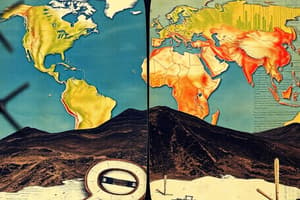Podcast
Questions and Answers
What is homeostasis?
What is homeostasis?
- The process of blockage in an organism's arteries
- The rapid increase in heart rate of an organism
- The normal, stable state of an organism (correct)
- A state of panic and fear in an organism
What is climate forcing?
What is climate forcing?
- A process that escalates or diminishes the initial warming of Earth's climate
- The point at which our planet's climate has suddenly shifted
- A physical process that instigates climate change (correct)
- All storage basins of water on Earth
What does a climate feedback mechanism do?
What does a climate feedback mechanism do?
- It is a normal, stable state of the Earth's climate
- It is a storage basin of water on Earth
- It shifts the planet's climate suddenly
- It either escalates or diminishes the initial warming of Earth's climate (correct)
What is the climate tipping point?
What is the climate tipping point?
What are the three climate change components that scientists investigate?
What are the three climate change components that scientists investigate?
What contributes to cooling or warming the climate?
What contributes to cooling or warming the climate?
Which factor plays a significant role in Earth's climate tipping point?
Which factor plays a significant role in Earth's climate tipping point?
What can lead to increased precipitation and vegetation growth in some regions?
What can lead to increased precipitation and vegetation growth in some regions?
What do positive feedback loops exacerbate and destabilize?
What do positive feedback loops exacerbate and destabilize?
What influences the amount of heat trapped near the Earth's surface?
What influences the amount of heat trapped near the Earth's surface?
What is the impact of ice albedo feedback mechanism on climate?
What is the impact of ice albedo feedback mechanism on climate?
What is the role of oceans in the climate system?
What is the role of oceans in the climate system?
How do oceans and forests contribute to carbon dioxide absorption?
How do oceans and forests contribute to carbon dioxide absorption?
What is the consequence of carbon dioxide absorption in oceans?
What is the consequence of carbon dioxide absorption in oceans?
How do negative feedback mechanisms contribute to Earth's climate system?
How do negative feedback mechanisms contribute to Earth's climate system?
Flashcards are hidden until you start studying
Study Notes
Climate Feedback Mechanisms Explained
- For every watt per square meter of radiative forcing absorbed by land or water, the planet's climate increases by 0.9 to 1.8 degrees Fahrenheit (0.5 to 1.0 degrees Celsius).
- Ice albedo feedback is a positive climate mechanism where melting ice leads to more available ocean water that absorbs sunlight, perpetuating the cycle of ice melting and heat being trapped.
- Warming ocean waters lead to sea level rise, affecting coastal communities and ecosystems.
- Oceans absorb more solar radiation than ice and land surfaces, releasing water vapor and aerosols into the atmosphere, facilitating cloud formation and generating precipitation.
- Oceans absorb carbon dioxide and store it deep within their basins, contributing to the greenhouse effect.
- Oceans and forests act as reservoirs for carbon dioxide, absorbing about one-third and one-quarter of human emissions, respectively.
- Carbon dioxide absorption in oceans leads to acidification, affecting marine life and coral reefs.
- Warmer oceans lead to less phytoplankton and reduced carbon absorption, while terrestrial plants benefit from increased carbon dioxide but are affected by deforestation and wildfires.
- Negative feedback mechanisms, like the water vapor-cloud feedback loop and atmosphere-biota interactions, help limit the amount of heat being trapped and stabilize Earth's climate system.
- The water vapor-cloud feedback loop involves the development of low-lying clouds that reflect some of the sun's radiative forcing, cooling the Earth's surface.
- Atmosphere-biota interactions involve plant and animal species absorbing heat to conduct photosynthesis, releasing water vapor into the atmosphere, which contributes to cloud formation and reflects radiant energy back into space.
- Overall, these feedback mechanisms play crucial roles in regulating Earth's climate, with positive feedback mechanisms exacerbating climate change and negative feedback mechanisms helping to stabilize it.
Studying That Suits You
Use AI to generate personalized quizzes and flashcards to suit your learning preferences.



